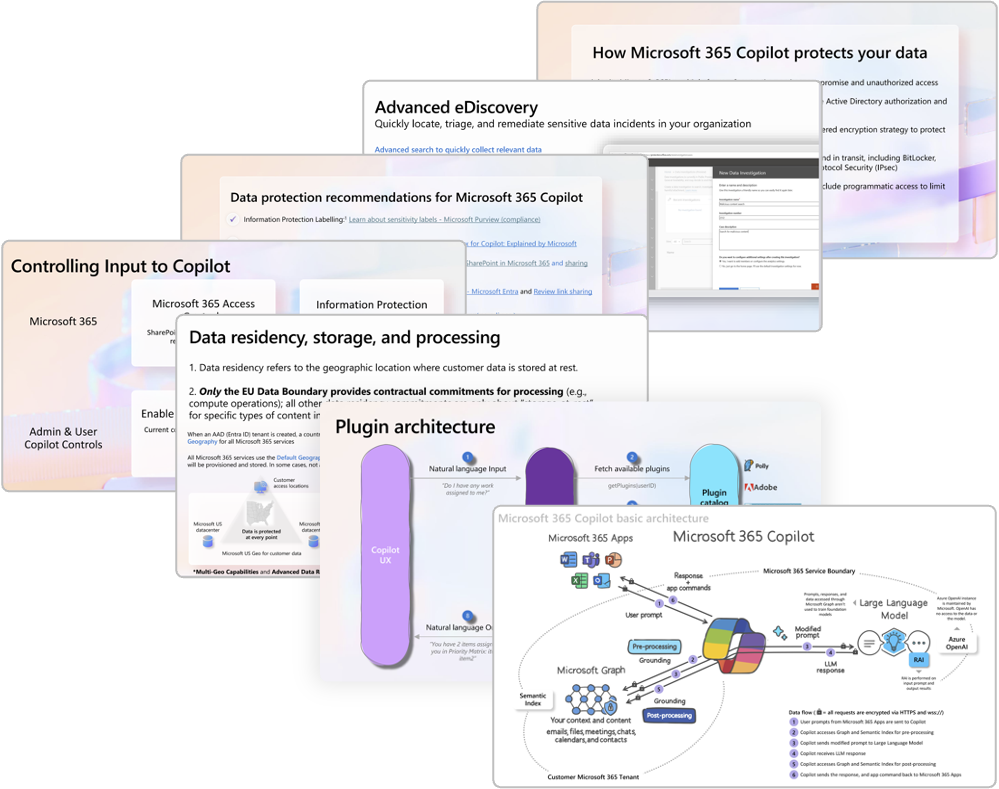Microsoft 365 Copilot is changing the way we work, offering powerful AI capabilities to boost productivity and collaboration. But with innovation comes important questions about security and privacy.
This blog explores how Microsoft 365 Copilot is designed to protect your data, mitigate risks, and align with global compliance standards, ensuring you can adopt AI with confidence.
Understanding Microsoft 365 Copilot’s Security Framework
Microsoft 365 Copilot is built on a foundation of advanced security and privacy features designed to protect your organization’s data at every stage. With encryption safeguarding information both in transit and at rest, organizations can ensure sensitive data remains secure. Copilot also includes advanced threat protection to identify and block phishing attempts, malware, and other vulnerabilities before they become a problem.
Another pivotal aspect of Copilot’s security is multi-factor authentication (MFA), which strengthens access controls by requiring multiple verification methods. Conditional access policies further enhance this framework by granting access only under predefined conditions, such as trusted devices or specific user roles. Together, these features form a robust defense against unauthorized access and data breaches.
In addition to these technical safeguards, Copilot adheres to strict global compliance standards, including GDPR, HIPAA, and ISO 27001. This makes it an ideal solution for highly regulated industries such as healthcare, legal, and finance, where protecting sensitive information is non-negotiable. Moreover, Microsoft 365 Copilot aligns with the principles of zero-trust security, a comprehensive approach that assumes breach and continuously validates each request as if it originates from an open network. Because data is accessed from various devices and locations, this approach ensures that resources are only accessible under strict conditions, reducing vulnerabilities and mitigating risks associated with increasingly sophisticated cyber threats.
Key Security Risks to Address Before Deployment
While Microsoft 365 Copilot offers numerous benefits, organizations must be prepared to address potential risks. One of the most significant concerns is sensitive data overexposure, which can occur if access controls are not configured correctly. Without proper safeguards, confidential information could inadvertently appear in AI-generated outputs, exposing the organization to reputational and compliance risks.
Another challenge lies in regulatory compliance. Improper handling of data could lead to violations of regulations such as GDPR or HIPAA, resulting in hefty fines and damaged credibility. Moreover, Copilot’s powerful capabilities require careful overseeing. Users with excessive or over-assigned permissions may misuse or inadvertently mishandle the tool, increasing the risk of data breaches or operational disruptions.
Sparta Services helps mitigate these risks by conducting thorough assessments and implementing tailored safeguards. With a structured approach, organizations can maintain strict access controls and regularly review user permissions to avoid these pitfalls.

Preparing Your Organization for Microsoft 365 Copilot
A secure Copilot deployment starts with readiness. The first step involves assessing your existing security infrastructure, including reviewing access controls and roles to ensure sensitive data remains protected. Leveraging Microsoft Purview’s data classification tools allows organizations to identify and secure confidential information before Copilot is deployed.
Updating security policies is equally important. Organizations must align their protocols with AI-specific requirements, outlining clear guidelines for data handling, storage, and sharing. Involving key stakeholders from IT, compliance, and legal teams ensures a comprehensive approach, addressing both operational and regulatory considerations.
Testing Copilot in a sandbox environment is another critical preparation step. This controlled environment allows organizations to evaluate the tool’s functionality and identify vulnerabilities before a full rollout.
Best Practices for Safe Copilot Adoption
Adopting Microsoft 365 Copilot securely requires a blend of technical measures and organizational best practices:
- Role-based access: Implementing role-based access controls is critical to limiting data exposure. By assigning permissions based on job responsibilities, employees can access only the information necessary for their roles. This minimizes the risk of unauthorized access, reduces the likelihood of sensitive data breaches, and strengthens your overall security posture.
- Data governance policies: A well-defined data governance policy provides clarity on how data is collected, stored, shared, and retained. These policies should include clear guidelines for secure data disposal, ensuring compliance with industry regulations and protecting sensitive information throughout its lifecycle.
- User training: Even the most advanced security measures can be undermined by human error. Comprehensive user training equips employees with the knowledge they need to use Copilot securely and avoid over-sharing sensitive data. Regular refresher sessions ensure employees remain informed about evolving security threats.
At Sparta Services, we simplify the process of securely adopting Microsoft 365 Copilot by tailoring configurations to your organization’s unique needs. From designing role-based access frameworks to crafting governance policies and delivering customized training, our team ensures your Copilot environment is both secure and optimized. We focus on aligning Copilot’s capabilities with your business objectives while safeguarding your sensitive data at every step.
Ongoing Cybersecurity with Managed Support
Security is not a one-time task—it’s an ongoing responsibility. A secure Copilot environment requires continuous oversight to adapt to evolving threats and organizational changes. Sparta Services provides comprehensive support through regular security audits, real-time monitoring, and proactive policy reviews. These measures ensure that vulnerabilities are identified and addressed before they become major issues.
Policy updates are another key element of ongoing security. As your organization evolves, so do its data handling needs. Sparta works closely with your team to update governance policies and ensure compliance with changing regulations. Additionally, 24/7 support is available to address any security concerns or technical challenges that may arise.
Securely Adopt Microsoft 365 Copilot
Microsoft 365 Copilot is reshaping the modern workplace with its innovative capabilities that enhance productivity and efficiency. However, to fully realize its transformative potential, security must remain a top priority. Without proper safeguards, the risks of data exposure or compliance violations could overshadow the benefits of this powerful AI-driven solution.
With the right preparation and safeguards in place, Microsoft 365 Copilot can deliver unparalleled benefits, empowering your teams while protecting critical data. Contact Sparta Services for expert guidance in adopting Microsoft 365 Copilot securely and supporting your success with IT services that grow with you.

Dave Galy
Dave Galy is the founder and CEO of Sparta Services


